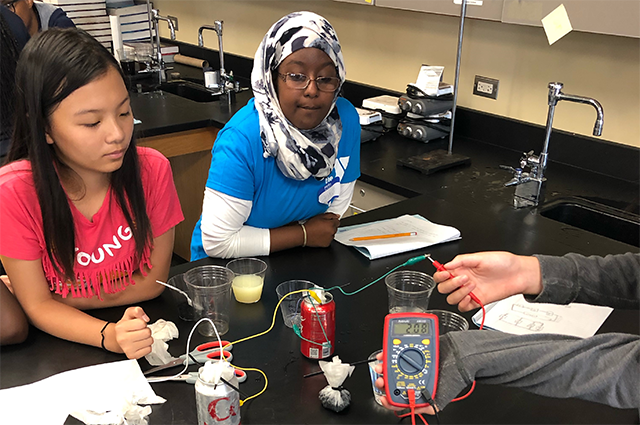The next generation of chemical engineers

When it comes to engineering-related activities that young budding engineers are exposed to, there are some mainstays that may come to mind: circuits, robots, coding, rockets, and more. “There are so many different ways that engineering can connect with students’ own interests, passions, and backgrounds. The more kinds of engineering they see and the more different pathways to engineering they are exposed to, the more they can see themselves pursuing it as a career,” says Merredith Portsmore, director of Tufts University’s Center for Engineering Education and Outreach (CEEO).
For the second consecutive summer, the CEEO partnered with Assistant Professor Ayse Asatekin’s Smart Polymers, Membranes, and Separations Laboratory to run a summer program that introduces participants to one discipline that isn’t always included in activities aimed at children: chemical engineering. The program combines the CEEO’s long history in K-12 engineering education and outreach activities with Asatekin’s expertise in chemical reactions, separations, filtration, and polymers.
In addition to helping children understand the true breadth of what engineering is, the organizers also wanted to find new ways to engage all kids in engineering, especially those from groups traditionally under-represented in STEM fields. The participants were all Malden middle school students between the ages of 11 and 15, and all were girls.
This August, 20 girls who signed up through the Malden YMCA learned about water filters, membranes, and spherification. They designed and created their own bouncy balls out of chemicals, made hot and cold packs, and turned milk into plastic, among many more hands-on activities offered during the week-long program hosted at Malden High School. Participants were encouraged to make observations and design decisions, figure out how processes work and how the students could improve them, and to connect the lessons to the real world.
Program participants got another dose of real-world experience at Tufts, where graduate student volunteers took them on lab tours and introduced them to the day-to-day work of what a chemical engineer does, and the participants had lunch with Tufts students and faculty. A small army of dedicated volunteers – including Tufts graduate and undergraduate students from the Department of Chemical and Biological Engineering, local high school students at the Malden YMCA, and Research Experiences for Undergraduates (REU) students studying at Tufts for the summer – and staff made the program happen. Chemical engineering major Isadora Shamah, E21, collaborated with the CEEO and Asatekin to develop, pilot, and test the activities that the campers participated in, building on the foundation created by past summer interns Abbey Klotz, E20, and Michael Forte, E19. Shamah led the camp this year with Russell Shute, AG16, a former chemical engineer turned high school teacher.
The program is the fruition of years of planning and stems from Asatekin’s National Science Foundation (NSF) Faculty Early Career Development Program (CAREER) Award, which included provisions for educational and outreach activities aimed at K-12 students. “We wanted to introduce some core ideas in chemical engineering, such as continuous and batch manufacturing and scale-up, as well as concepts in polymer science and separations. We also aimed to show the diversity of fields that chemical engineers work in and have an impact on, from clean energy to developing and manufacturing medicine to food applications,” says Asatekin, who attended the camp and saw firsthand the girls’ high levels of interest and engagement. “It is a pleasure for me, and for our Tufts students too, to interact with middle school girls and introduce them to chemical engineering. I hope the summer camp will help encourage girls to follow this career path.”
When asked to reflect on their experiences, the middle school students talk about learning how to power a cell phone, developing pill coatings, being introduced to polymers, and the new friends they made. “What I really like about chemical engineering is that I learned new things that I probably wouldn’t have even learned in school,” says one seventh-grader who attended. Other participants agree. “I wish that the program was longer because I enjoyed it so much,” says a sixth-grader.
Activities from the program will be shared at the upcoming 2020 American Society for Engineering Education (ASEE) Annual Conference and Exposition, and will be made available on ceeo.tufts.edu.
Department:
Chemical and Biological Engineering